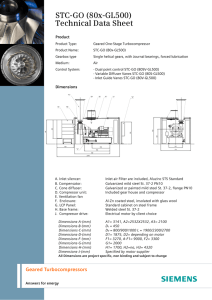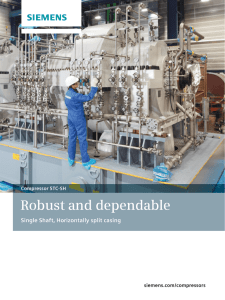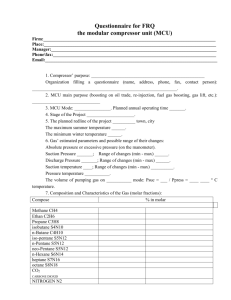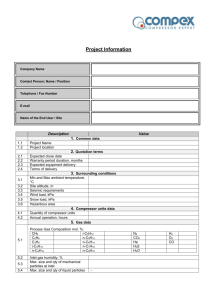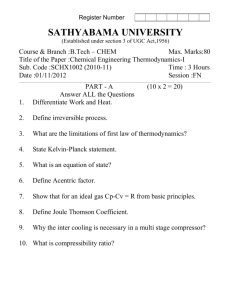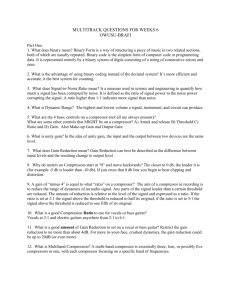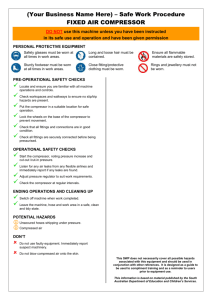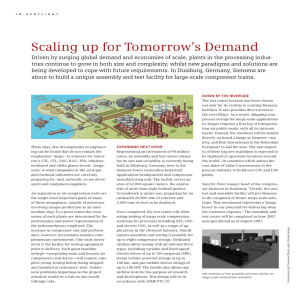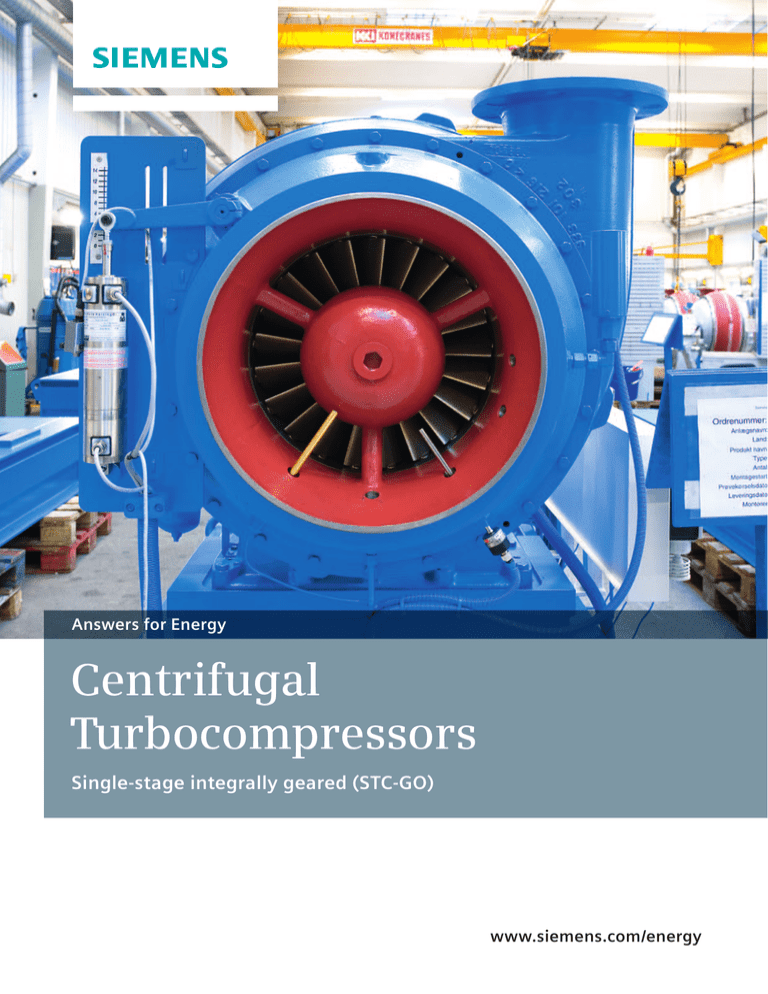
Answers for Energy
Centrifugal
Turbo­compressors
Single-stage integrally geared (STC-GO)
www.siemens.com/energy
3
Highest efficiency,
compact design
Siemens designs and manufactures high-performance
aeration technology for municipal wastewater treatment
and ­industrial applications.
The efficient STC-GO compressors are made uniquely
according to plant specifications thereby consuming
significantly less energy compared to other compressor
designs. The high quality compressor components and
the conformity with technical standards for a broad range
of applications ensure long-term reliability and minimum
maintenance.
With more than 7,000 of units operating worldwide,
­Siemens has become the m
­ arket leader within its specific
­application areas.
The manufacturing site of the Siemens STC-GO compressors is together with our research and development
center located in Helsingør/Denmark. Here our highly
skilled production workers, dedicated engineers and
biological experts are constantly improving compressor
technologies, while keeping a main focus on optimized
efficiency and less energy consumption.
Highlights
Highest efficiency is automatically and continuously maintained over the entire turndown range,
including off-design ambient temperatures and
pressures where units most often operate
Turndown to 45 % (or less) at constant speed
Variable flow by means of variable vane diffusers,
pre-rotational inlet guide vanes or a combination
of both systems, the Dual-Point-Control™
High-quality bearing construction results in
exceptionally long life with minimal maintenance
Guaranteed oil-free air delivery
Compact design saves floor space and
facilitates the replacement of older, less
efficient compressors
Standard or tailor made Instrumentation and
control for compressor operation compressor
operation.
Low noise level with no pressure pulsation
Low operating and maintenance costs
4
Siemens Turbocompressors (STC) for Aeration
30
kW
1.75
20
kW
50
kW
100
kW
150
kW
200
kW
300
kW
400
kW
1.000
kW
2.000
kW
GO(80)
GO(66)
GO(44)
GO(22)
10
kW
GO(10)
1.25
GO(5)
Integrally geared, one stage
GO(100)
2.25
GO(2)
Differential Pressure (barg)
3.0
0.75
0.25
1,000
10,000
100,000
Actual flow (m³/h)
Conditions: 1.013 bar, 20 degrees C, 36% RH
STC-GO product range
Fields of application
Wastewater treatment
Biological treatment of effluent in:
Municipal sewage
Industrial sewage
Flue gas desulfurization
Oxidation air blowers associated with the cleaning of flue
gases produced within power and heavy industry.
Fermentation and enzyme production
Biochemical treatment within pharmaceutical and yeast
production industry and similar biological processes
Pulp and paper processes
Furnaces and smelters
Air blowers providing combustion or reaction air primarily
for the petrochemical and metals industries.
Sulphur recovery
Air blowers providing reaction air for the catalytic recovery
of sulphur within the petrochemical industry.
5
Compressor flow and
pressure range
Flow and pressure range from 1,000 to 125,000 Nm3. Differential pressure up to 2.5 bar (up to 4 bar possible with
two stage design).
The Siemens STC-GO compressor series for municipal and
industrial applications is comprised of different sizes. Siemens offers a complete package consisting of an integrated gearbox, coupling, electric motor and lube oil system,
all mounted on a common base frame.
Efficiency by design
The Siemens STC-GO compressor has an advanced
­mechanical & aero-dynamical design and cutting edge
control system. The air-end and integral gearbox have
been developed and evolved after 30 years of manufacturing experience creating the most high efficient air
­compressor today in the market.
A proper designed compressor is customized to site conditions, consuming ­minimal required power. Compressors
may be controlled by variable inlet guide vanes, variable diffusers, or both. The choice between the different
­control systems Is based on variable flow rate demand,
the discharge pressure and ­ambient conditions.
Small-sized compressor unit STC-GO (10)
Inlet flow from ca. 2,000–3,3000 Nm3/hour and
differential pressure from 0.4–1.9 bar.
Small-sized compressor unit STC-GO (10)
Inlet flow from ca. 2,000–3,3000 Nm3/hour and differential
pressure from 0.4–1.9 bar.
Large-sized compressor unit STC-GO (80)
inlet flow from 40,000 – 80,000 Nm3 /hour and differential
pressure from and differential pressure from 0.4 –1.5 bar.
Eintrittsleitschaufeln
Small-sized compressor unit STC-GO (10)
Inlet flow from ca. 2,000–3,3000 Nm3/hour and
differential pressure from 0.4–1.9 bar.
STC-GO (10SV-GL285) Special application
for flue gas desulfurization.
Flow 11,360 m3/hour –2.56 bar.
STC-GO (22V-GL315) Special application
for sulfur recovery unit.
Mid-sized compressor unit STC-GO (22V-GL315) for
­constant air flow of 19,190 m3 /hour –0.910 bar.
6
Different compressor
control configurations:
Variable diffuser and inlet guide vane system
This design features the unique S
­ iemens Dual Point Control™
with both inlet guide vanes and variable diffusers, which ensures high efficiency operation – even at off-design conditions.
This makes STC-GO especially s­ uitable when operating requirements are characterized by substantial f­ luctuation in inlet temperature, discharge pressure and flow.
H IS, REL [%]
110
100
100
90
95
80
90
70
0
20
40
60
80
100
Flow [%]
Variable diffuser system
Equipped with a variable diffuser system, STC-GO has relatively
steep performance curves and is thus parti­cularly well suited for
high efficiency operation at relatively constant dis­charge pressure
and inlet temperature.
Inlet guide vane
H IS, REL [%]
110
Aerodynamic design
100
90
90
80
80
70
70
0
20
40
60
80
100
Flow [%]
Inlet guide vane system
Equipped with an inlet guide vane ­system (IGV), STC-GO is the
most efficient solution for applications ­demanding high flow
rates. This design also complies with API s­ tan­dards and is highly
suitable for ­industrial applications.
H IS, REL [%]
110
100
100
90
95
90
80
70
0
20
40
60
Flow [%]
7
80
100
All components in the air stream are ­aerodynamically
designed to minimize ­turbulence, thus streamlining flow
through the compressor.
Variable diffuser system
The variable diffuser system controls the flow by adjusting
the angle and ­consequently, the nozzle area of 17 to 21
diffuser vanes. The vanes are flow optimized, non-symmetrical airfoils, ­allowing adjustment of the nozzle area,
while still maintaining an excellent efficiency throughout
the entire operational range of the compressor. The vanes
are arranged radially around the impeller.
Inlet guide vane system
The inlet guide vane system (IGV) ­controls the incidence
angle of the inlet flow to the impeller, and thus influences
the relative speed of the air. This allows the adjustment of
the delivered head from the compressor and optimization
of power consumption according to changes in operational parameters such as inlet temperature, outlet pressure,
etc.
The Impeller:
The core of the compressor is the im­peller with backward
leaning blades angled according to regulation and milled
from a solid forged piece of high grade aluminum alloy
Diffusor vanes
(originating from the ­aircraft industry), with an optimal
weight/strength ratio. Siemens easily customize the
design of the semi-open three-dimensional impeller by
means of 3-dimensional simulation software (CFD Computer Fluid Dynamic Simulation) to meet individual plant
requirements. The impeller design is based on an extensive database comprising full factory tests of more than
7,000 compressors as well as full scale tests and finite element analysis.
Different gear types for different requirements
Siemens offers several different combinations of airends and gearboxes. Selection depends on the capacity,
required power and type of driver. All gearboxes share
similar heavy-duty design features for long and low maintenance operation.
Inlet air is continuously and automatically pre-rotated
by 13 to 24 non-symmetrical airfoils, arranged radially
around the c­ oncentric inlet, thus maximizing ­efficiency
throughout the operational range. The vanes are supported at both ends, an unusually strong and long-­lasting
­configuration.
Mechanical design
The STC-GO series consist of single-stage compressors
with integrated gearboxes. Compressor and gearbox are
standard, fully integrated with vertical split and the pinion
shaft above the drive shaft. The design is compact and
easy to maintain. All gearwheels are customized according to compressor configuration.
Ball bearing unit with helical gear and diffusor vanes
for optimal efficiency
8
GL-gear type series
The gears are helical cut from high grade steel alloy,
case hardened and grinded to close tolerances. The bearings are hydrodynamic multi-pad bearings with forced
oil ­lubrication. The designed bearing lifetime is 100,000
­operational hours.
The design ensures easy access to vibration and temperature probes, which can be equipped optionally. The
air and oil seals are non-contact labyrinth type. Gears
and bearings are pressure lubri­cated by electrically and
­mechanically driven oil pumps.
The GL-gearboxes allows for higher flow and higher pressure within the range of STC-GO compressors and extend
the maintenance intervals.
Model GK gearbox
GK-gear type series
Aeration installations in smaller decentralized wastewater
treatment plants often require special needs as regards
compressor design and performance. The GK series are
ideal for small-scale plants, because they offer a particularly
compact design, with an integrated g
­ earbox equipped with
ball bearings l­ubricated by an integrated oil pump.
Special gear type series
The special GC-gear type is a planetary two stage co-axial
gearbox for diesel or gas engine drivers, well suited for
­applications such as methane recovery processes. This
type of gearbox is ­designed for increased torsional forces
originating from the driver.
Efficiency by control
The efficiency of the aeration equipment ultimately
depends on the control system.
The Siemens compressors are provided with safeguards
and monitors for long-term, trouble free operation. Other
instruments are available to monitor compressor operation and include vibration and bearing temperature monitors that are generally used on larger units. ­Maintenance
status monitors are available for inlet air filters, oil filters,
oil r­eservoir level, and reverse rotation.
Model GL gearbox
9
Local Control
The Siemens local control panel (LCP) is specially designed
for monitoring and controlling the STC-GO compressor
with diffuser and inlet guide vanes (IGV).
Standard features:
Control panel mounted on-skid or off-skid
Control is provided by an internal ­Siemens PLC type
S7-300 with job c­ ustomized software
Special features:
Systems may be designed to accommodate specific client
needs, for instance:
Different PLC platforms
Equipped with touch panel operator interface with
B/W or colour screen
Other network communication: ­PROFIBUS DP, Ethernet,
MODBUS
Emergency stop push button
Housing in EEx certified enclosures of IP65 for hazardous
area applications
Factory tested
Protection class IP54, colour RAL7032
Power supply according to specific ­requirements
PROFIBUS communication
Multilanguage interface
The local control panel is also provided with
contactors for auxiliary equipment, such as
Actuator for the blow-off valve
Electric motor for the lube oil pump
Electric motor for the air/oil cooler fan (if any)
Servomotor for the variable diffuser
Modification for tropical environment
Remote online support via GSM modem
Trending of operational data
Vibration and monitoring devices
STC-GO compressors for municipal and industrial
­applications can be equipped with vibration detection
and ­monitoring devices:
Accelerometer offers vibration d
­ etection and monitoring,
the ­analogue signal is connected directly to the PLC in
the LCP
Proximity probes for radial and axial shaft vibration
monitoring
Servomotor for the Inlet Guide Vane system (if any).
Master control
The master control panel (MCP) is designed for automatically controlling the air supply from a compressor group
arrangement from 2 up to 15 STC-GO compressor units.
With the MCP control using the highly efficient cascade
control philosophy, the process is constantly ­provided
with the right amount of oxygen.
This kind of regulation ensures:
Maximum efficiency and lower energy consumption
Accurate control – even under ­fluctuating conditions
Priority control allowing the turbo ­compressors to
equalize their working hours
MCP single overview
Easy overview of each compressor’s o
­ perational status
Single overview for the operator on the complete
compressor system showing all events and system
messages
Direct indication of main discharge pipe pressure
and set-point
All critical functions and settings are password
protected
Control panel
10
Details Compressor Station
MCP single overview
Standard features:
Control panel installed remotely
Control by Siemens PLC S7-300 system
Equipped with touch panel interface with B/W
or optional color screen
Factory tested before delivery
Protection class IP54
Power supply: According to customer requirements
Multi-language interface
Profibus communication to DCS system
Special features:
Systems can optionally be designed to ­accommodate
specific client needs, like:
Easy connection to DCS/SCADA systems via Profibus
DP, TCP/IP, Siemens Ethernet or Modbus RS485
System input/output for remote ­monitoring
and control via SCADA
Total Integrated Control
The next step for efficient control is the Air Bio Control
system (ABC). Siemens can provide overall control and
monitoring of the complete aeration system as one highly
efficient, integrated unit. This includes control of the
blowers, air flow control valves, air header blow-off valve,
flow meters, dissolved oxygen and ammonium sensors.
The prime advantages of the system solutions include:
Single-source responsibility
System integration
Greater overall efficiency
Better control and smoother operation
Avoiding interface issues
Start-up and fine tuning
Greater system reliability
On-line support via modem (wireless or PSTN)
Overlapping of blowers A, B, C
Different PLC platforms
Redundancy requirements
Remote online support via GSM modem
Different sizes and materials for special applications
Housing in EEx certified enclosures of IP65 for
hazardous area applications
Modification for tropical environment
11
Power consumption
Process trending
400
300
200
100
0
0
100
200
Capacity
300
Testing
Standard Shop Test
Each compressor core unit is tested in our advanced
test-rigs in accordance with our Standard Shop Test
specifi­cation. The test-rigs are certified every year
­according to ISO 9001 and the calibration procedures
are conducted at regular intervals according to ASME,
ISO and API international standards.
During the Standard Shop Test, each compressor is operated at maximum ­design load for 3–10 operating hours,
depending on the compressor type. The test procedures
have been developed during decades of testing thousands
of turbo-compressors and must fulfill the following
purposes:
Provide data over the entire specified operational range
for the quality a
­ pproval.
Provide data for the automated power saving program
with variable diffuser and inlet guide vane system.
Provide specific and statistical data as feedback for
the compressor design program.
Provide to the customer documentation of the performance data and the performance range in the form of a
graphic presentation.
Torque meter test
By measuring the torque using a ­precision torque meter
and the rpm of the driver.
Electric motor test
By performing an energy balance on the driver in
accordance with the ­appropriate test codes for the
­particular type of machine.
Additional testing
In addition to the mandatory tests ­Siemens offers to
customers an optional testing portfolio.
Witness test
The test will be conducted by an e
­ xperienced engineer
in cooperation with the test-bed foreman according to
international standards. The complete test procedure is
witnessed either by the customer itself or a third party, i.e.
an ­inspector from an independent and ­neutral inspection
company.
Certified test
When the client is not in the position to attend the
witness test a certified test can be offered. An experienced test e
­ ngineer will conduct this test. Test log sheets
will be signed by the test engineer certifying specified test
points selected by the customer.
Specifically during the Standard Shop Test are performed
the followings:
National and International Test Standards
Mechanical/Operational test
The lubricating-oil system is put into ­operation and the
safety controls are checked and adjusted.
Siemens’ compressor-testing procedures, as well as the
testing equipment, instrumentation, and calibration are in
conformity with the national and international norms of
testing turbo-compressors:
Initially the compressor is running at low load and special
attention is paid to vibrations, the temperature rise of the
bearing covers and the labyrinth seal flanges. The housings, flanges, and pipes, including the lube oil system, are
checked for t­ ightness.
Vibration measurements
According to ISO 10816, each compressor is run at maximum load and the ­vibration velocity is recorded within the
range 10–1,000 Hz.
Noise measurements
According to ISO 3746, the sound-pressure measurements
are recorded and an engineer evaluates the test data in
­relation to the specified data. A noise certificate can be
issued on customer request
Performance test
Heat balance test
By establishing a total energy balance for the compressor, by measuring all the losses and adding them to the
­energy input to the compressed gas.
ISO 5389-2, Dec. 2005:
Turbo compressors – Performance Test Code
PTC 10 – 1997
Performance Test Code on Compressors and Exhausters
API Standard 672 fourth Edition, March 2004:
Packaged, Integrally Geared Centrifugal Air Compressors
for Petroleum, Chemical, and Gas Industry Services
EN ISO 5167-1, 2003/EN ISO 5167-2, Jan. 2004:
Measurement of Fluid Flow by Means of Pressure
Differential Devices
ISO 10816-1, 1995:
Mechanical Vibration
ISO 3746, 1995
Acoustics – Determination of Sound Power Levels
of Noise Sources Using Sound Pressure
EN ISO 9001, 2000
Quality Management Systems- Fundamentals
and Vocabulary.
Published by and copyright © 2012:
Siemens AG
Energy Sector
Freyeslebenstrasse 1
91058 Erlangen, Germany
Siemens AG, Energy Sector
Oil & Gas Division
Wolfgang-Reuter-Platz
47053 Duisburg, Germany
For more information, please contact
our Customer Support Center.
Phone:+49 180 524 70 00
Fax: +49 180 524 24 71
(Charges depending on provider)
E-mail: support.energy@siemens.com
Oil & Gas Division
Order No. E50001-G420-A121-V1-4A00
Printed in Germany
Dispo 34806, c4bs 74889, bdk xxxxxx,
P WS 03123.
Printed on elementary chlorine-free bleached paper.
All rights reserved.
Trademarks mentioned in this document are the property
of Siemens AG, its affiliates or their respective owners.
Subject to change without prior notice. The information in
this d
­ ocument contains general descriptions of the technical
options available, which may not apply in all cases.
The required technical options should therefore be specified
in the contract.

